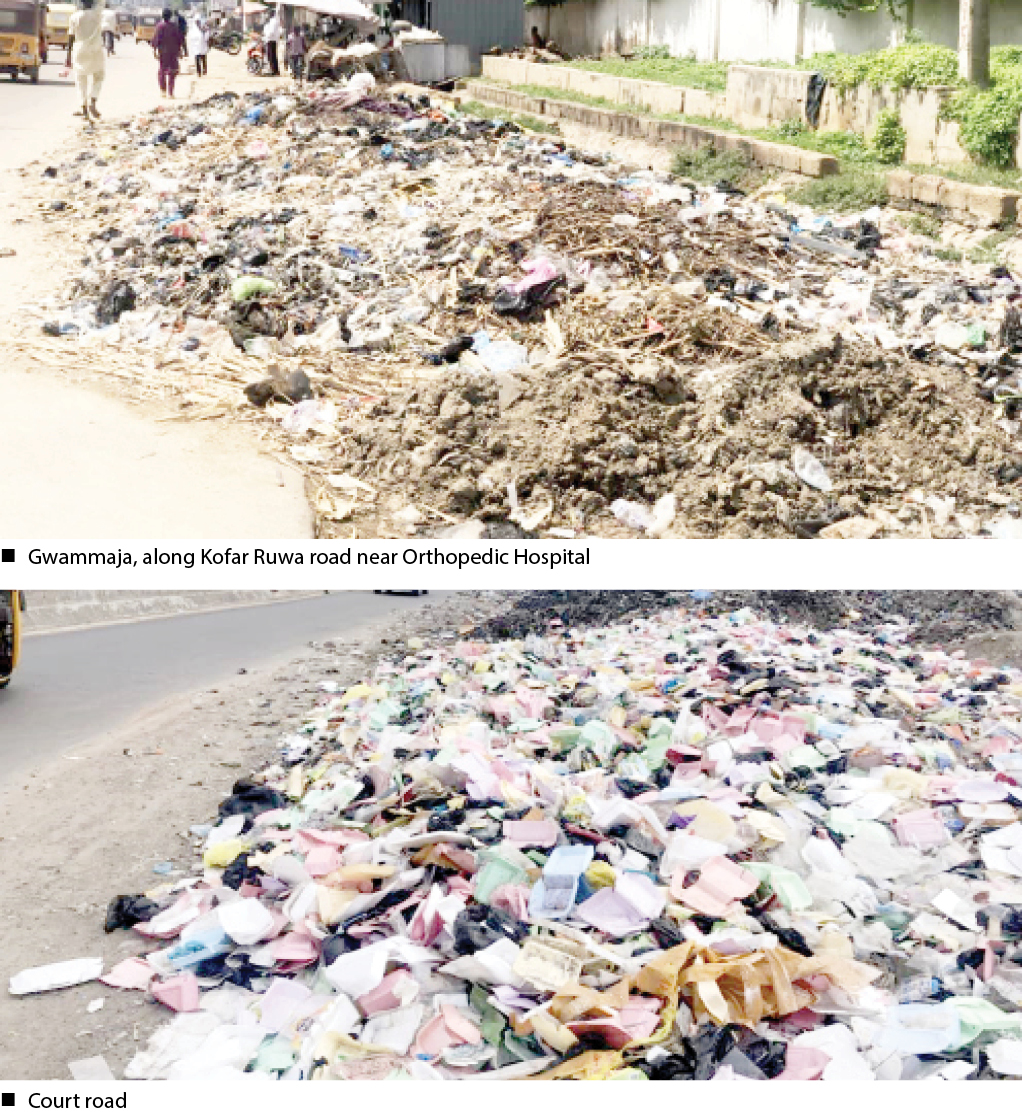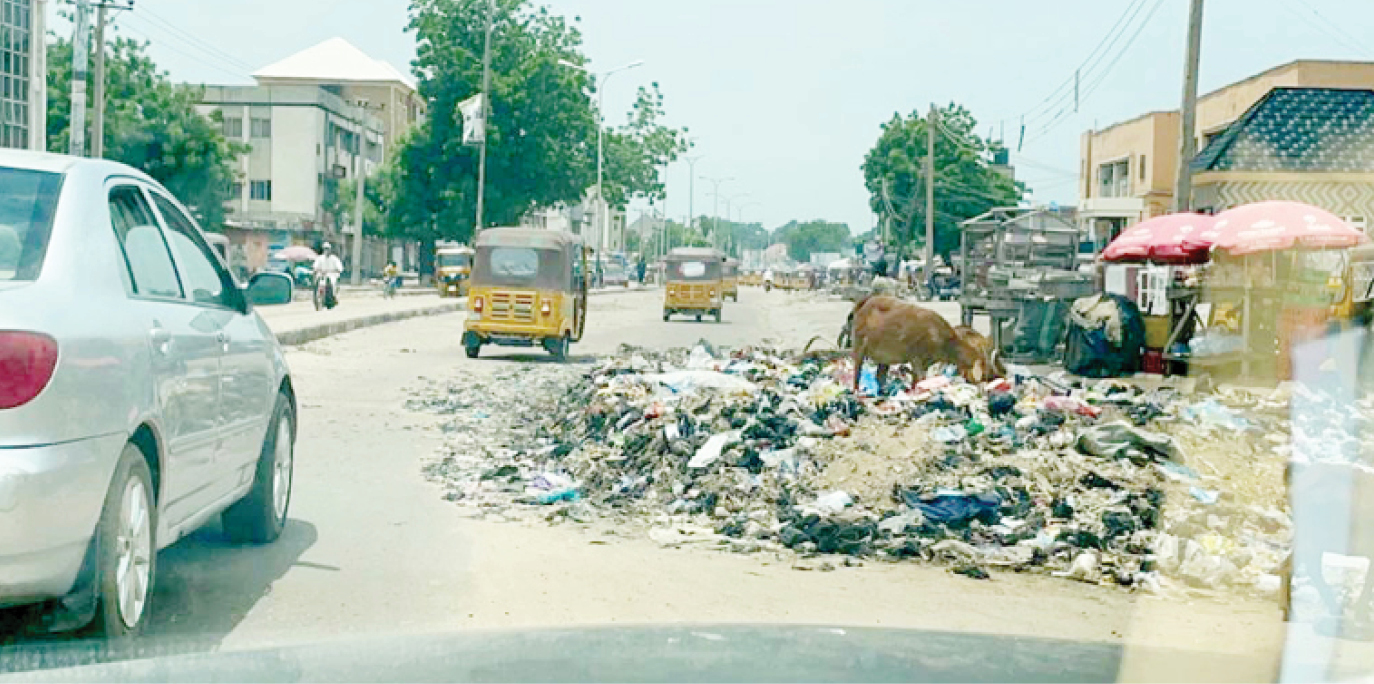Several streets and major roads across Kano metropolis have been taken over by heaps of refuse, Daily Trust reports.
From Kofar Dawanau to Sharada to Court Road, Sabongari to Kofar Ruwa to Northwest to Tarauni to Kofar Wambai, Daily Trust observed that there is hardly any part of the state metropolis that does not have heaps of refuse dump on the roads.
The situation, which many residents said have never been this bad, is despite the announcement of the “immediate set-up of a Task force on Refuse Disposal, Evacuation of Drainage and Streets Cleaning (Operation Nazafa)” by the state governor, Abba Kabir Yusuf, during his inauguration on May 29.
“In the coming days, I will officially launch a state-wide campaign with self-help groups to drive the operation. In the next few weeks, all the dumps will be cleared, all our streets will be clean, all our drainage will be desilted and a sustainable system of maintaining the cleanliness and clearing the dumps will be in place,” the governor said.
INEC refused to provide documents we asked for – Obi alleges
Son remanded for beating, threatening to kill mother
Though Operation Nazafa was only officially launched on August 28, Daily Trust reports that the task force set up by the governor had been seen evacuating some refuse across the city during the early days of the administration. The head of the task force, Ahmadu Dan Zago, who was later appointed as the Managing Director of the restored Refuse Management and Sanitation Board (REMASAB) had said several tonnes of waste were evacuated during that period.

With the state having over 50 dumping sites, waste management experts said the lack of proper waste disposal management as well as poor attitude of residents to waste management has made streets and drainage converted to dumping sites, thereby complicating the works of REMASAB.
Similarly, the state government had said the situation it met on the ground with the scrapping of REMASAB by the previous government exacerbated the problem of waste management in the city.
“When we came, there were only two vehicles working and we had to adopt a fire brigade approach just as you said with the setting up of a task force by the governor to see that refuse in the state is cleared and upon my appointment, the governor gave us a matching order and we had to start by fixing some of the vehicles in bad conditions.
“But you know the waste that has been generated in Kano has become so much that we have already evacuated over 40 tonnes of the waste and we are still working hard to clear the remaining after which we will sustain the tempo,” the state Commissioner for Environment, Nasiru Sule-Garo, earlier told Daily Trust.
Sule-Garo, who spoke after he had mobilised his team to clear up refuse dumped on a major street following a Daily Trust report in July, said the ministry had also re-engaged the street sweepers and there is a proposal in the pipeline to acquire street sweeping vehicles.
He also said the ministry would be meeting with market managements to understand why waste generated from the markets were being dumped on the roads, especially when informed that each market charges shop owners for waste disposal.
Improper waste management responsible for perennial diseases – Experts
Speaking with Daily Trust, an epidemiologist, Dr Shuaib Sani, said one of the greatest public health discoveries of the 21st century is that of environmental health and sanitation.
“There is a strong relationship between people, their health, and their environment. Mishandled and indiscriminate waste disposal are great public health hazards attracting disease and disease-causing agents like mice, mosquitoes, bacteria, and viruses, which lead to cycles of issues like malaria, typhoid, and cholera impacting local neighborhoods and contributing to environmental degradation, increasing urban poverty, and deterring sustainability,” he said.
An environmentalist, Dr Garba Saleh Ahmad, also told Daily Trust that since most of the materials that make up the heap of refuse are plastic, “their first environmental effect is that they block drainage and waterways and this causes flooding. Another environmental effect is that when set on fire, these materials are cancerogenic. Also, they lead to stagnation and become breeding grounds for mosquitoes and subsequently lead to rise in malaria in our communities.”
Daily Trust reports that many families have been lamenting on how they have been battling with treating malaria with pharmacists in several hospitals and private ones confirming that malaria drugs are the most dispensed in the state in the last months.
Meanwhile, the state governor, Abba Kabir Yusuf, while flagging off the Operation Nazafa Gida-Gida, said the initiative was “part of our broader plan to ensure that we win the fight against indiscriminate dumping of waste, and to entrench proper sanitation practices in our communities.” He appealed to residents to key into the initiative and cautioned the residents, developers and shop owners against reckless dumping of waste.

 Join Daily Trust WhatsApp Community For Quick Access To News and Happenings Around You.
Join Daily Trust WhatsApp Community For Quick Access To News and Happenings Around You.


